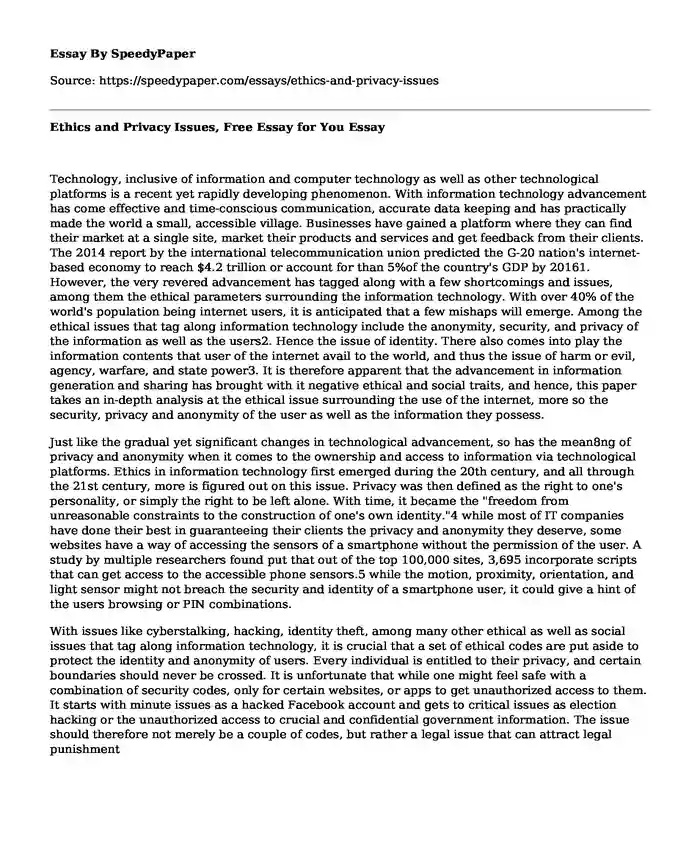Technology, inclusive of information and computer technology as well as other technological platforms is a recent yet rapidly developing phenomenon. With information technology advancement has come effective and time-conscious communication, accurate data keeping and has practically made the world a small, accessible village. Businesses have gained a platform where they can find their market at a single site, market their products and services and get feedback from their clients. The 2014 report by the international telecommunication union predicted the G-20 nation's internet-based economy to reach $4.2 trillion or account for than 5%of the country's GDP by 20161. However, the very revered advancement has tagged along with a few shortcomings and issues, among them the ethical parameters surrounding the information technology. With over 40% of the world's population being internet users, it is anticipated that a few mishaps will emerge. Among the ethical issues that tag along information technology include the anonymity, security, and privacy of the information as well as the users2. Hence the issue of identity. There also comes into play the information contents that user of the internet avail to the world, and thus the issue of harm or evil, agency, warfare, and state power3. It is therefore apparent that the advancement in information generation and sharing has brought with it negative ethical and social traits, and hence, this paper takes an in-depth analysis at the ethical issue surrounding the use of the internet, more so the security, privacy and anonymity of the user as well as the information they possess.
Just like the gradual yet significant changes in technological advancement, so has the mean8ng of privacy and anonymity when it comes to the ownership and access to information via technological platforms. Ethics in information technology first emerged during the 20th century, and all through the 21st century, more is figured out on this issue. Privacy was then defined as the right to one's personality, or simply the right to be left alone. With time, it became the "freedom from unreasonable constraints to the construction of one's own identity."4 while most of IT companies have done their best in guaranteeing their clients the privacy and anonymity they deserve, some websites have a way of accessing the sensors of a smartphone without the permission of the user. A study by multiple researchers found put that out of the top 100,000 sites, 3,695 incorporate scripts that can get access to the accessible phone sensors.5 while the motion, proximity, orientation, and light sensor might not breach the security and identity of a smartphone user, it could give a hint of the users browsing or PIN combinations.
With issues like cyberstalking, hacking, identity theft, among many other ethical as well as social issues that tag along information technology, it is crucial that a set of ethical codes are put aside to protect the identity and anonymity of users. Every individual is entitled to their privacy, and certain boundaries should never be crossed. It is unfortunate that while one might feel safe with a combination of security codes, only for certain websites, or apps to get unauthorized access to them. It starts with minute issues as a hacked Facebook account and gets to critical issues as election hacking or the unauthorized access to crucial and confidential government information. The issue should therefore not merely be a couple of codes, but rather a legal issue that can attract legal punishment
Works Cited
1. Taddeo M. (2016). Ethics and Information Technologies: History and Themes of a Research Field. Pp. 1-16
2. TavaniH. T. (2003). Ethics and technology: Ethical issues in an age of information and communication technology. P. 349
3. Florida L., & Taddeo, M. (Eds.). (2014).The ethics of information warfare. New York: Springer.
4. AgreP. (1997). Technology and privacy the new landscape. Retrieved May 19, 2013, from http://site.ebrary.com/id/10015368
5. Newman L.H (2018). Mobile websites can tap into your phone's sensors without asking. Wired. https://www.wired.com/story/mobile-websites-can-tap-into-your-phones-sensors-without-asking/?mbid=email_onsiteshare
Cite this page
Ethics and Privacy Issues, Free Essay for You. (2022, Oct 12). Retrieved from https://speedypaper.com/essays/ethics-and-privacy-issues
Request Removal
If you are the original author of this essay and no longer wish to have it published on the SpeedyPaper website, please click below to request its removal:
- Economics Essay Sample: National Minimum Wages
- Free Essay on Health Promotion Programs
- Essay Sample on MBA and Its Implications in HRM Job Position
- Employment Laws Essay Sample
- Free Paper with Data Analysis Report: Effect of Employee Stress on an Organization
- Paper Example on Ethics and Policy
- Paper Example on the Four Stages of the Creative Process
Popular categories





